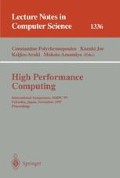Abstract
The Thread Synchronization Unit (TSU) is a hardware mechanism that provides data-driven thread synchronization and data consistency for multi-threaded architectures built with control-flow (i.e. commodity) microprocessors. The TSU design is based on the Decoupled Data-Driven model of execution. This model decouples the synchronization from the computation portions of a program and allows them to execute asynchronously. At compile time a program is partitioned into a number of threads of variable granularity and the Data-Driven thread synchronization graph is also constructed. The TSU is responsible for maintaining the synchronization graph implicitly, it determines when a thread is ready for execution without interruption and then feeds it to the microprocessor for execution. The TSU-based machines exhibit the tolerance to long memory and communication latencies, of the data-driven model, with very little overhead and also exploits short-term optimal cache placement and replacement policies.
This material is based upon work supported in part by the National Science Foundation under Grant No. CCR-93-095572 and in part by the University of Cyprus Research Council
Preview
Unable to display preview. Download preview PDF.
References
P. Evripidou and J-L. Gaudiot. The USC Decoupled Multilevel Data-Flow Execution Model. In Advanced Topics in Data-Flow Computing. Prentice Hall, 1990.
P. Evripidou and J-L. Gaudiot. A Decoupled Graph/Computation Data-Driven Architecture with Variable Resolution Actors. In Proceedings of the 1990 International Conference on Parallel Processing, August 1990.
R. A. Iannucci. Toward a Dataflow/von Neumann hybrid architecture. In Proceedings of the 15 th Annual Symposium on Computer Architecture, May 1988.
L. Bic. A process-oriented model for efficient execution of Dataflow programs. In The 7th International Conference on Distributed Computing, Berlin, FRG, 1987.
R.S. Nikhil and Arvind. Can dataflow subsume von neumann computing. In Proceedings of the 16th Annual Symposium on Computer Architecture, May 1989.
P. Evripidou and R. Barry. Mapping FORTRAN Programs to Single Assignent Semantics for Efficient Parallelization. Parallel Processing Letters, In Press, 1997.
Arvind and K.P. Gostelow. The U-Interpreter. IEEE Computer, pages 42–49, February 1982.
P. Evripidou and J-L Gaudiot. Block Scheduling of Iterative Algorithms and Graph Priority in a Simulated Data-flow Multiprocessor. IEEE Transactions on Parallel and Distributed Systems, 4(4), April 1993.
Author information
Authors and Affiliations
Editor information
Rights and permissions
Copyright information
© 1997 Springer-Verlag Berlin Heidelberg
About this paper
Cite this paper
Evripidou, P. (1997). Thread Synchronization Unit (TSU): A building block for high performance computers. In: Polychronopoulos, C., Joe, K., Araki, K., Amamiya, M. (eds) High Performance Computing. ISHPC 1997. Lecture Notes in Computer Science, vol 1336. Springer, Berlin, Heidelberg. https://doi.org/10.1007/BFb0024209
Download citation
DOI: https://doi.org/10.1007/BFb0024209
Published:
Publisher Name: Springer, Berlin, Heidelberg
Print ISBN: 978-3-540-63766-0
Online ISBN: 978-3-540-69644-5
eBook Packages: Springer Book Archive

